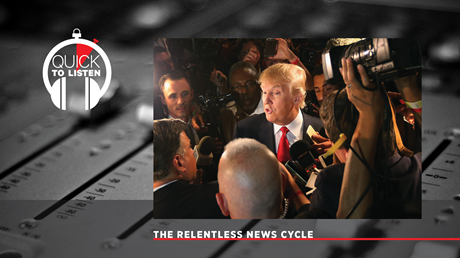How to stay informed about what’s important without wearing yourself down.

“This is Your Brain on Trump TV,” is the title of a recent piece at The American Conservative published in between the president’s incendiary tweets about North Korea and his leaked disparaging remarks about those from African countries and Haiti. While the former comments caused concern, the latter led to what has now become a routine cycle of debate, criticism, analysis, and pushback.
“Trump fascinates all Americans, it seems,” wrote Gracy Olmstead. “We hate him or love him, fear him or idolize him.”
Christians are not immune to these reactions, a state that can often leave news consumers exhausted, burned out, and unclear about how to separate inflammatory but ultimately unsubstantial reports from stories reporting on news with severe or dire consequences.
“The style of Trump’s comments are like something you’d expect to see out of a soap opera or something on TV and yet they’re happening in the real world, so how are supposed to react to something that in essence seems too incendiary or sensational to take seriously but could threaten nuclear war?” said Olmstead. “What’s the wise and measured stance to take as a media person? As a citizen?”
Olmstead joined associate digital media producer Morgan Lee and editor in chief Mark Galli to discuss how to avoid news burnout, the media’s particular challenge in the Trump era and internet age, and the extraordinary prescience of Neil Postman.
What is “Quick to Listen”? Read more
Subscribe to “Quick to Listen” on Apple Podcasts
Follow the podcast on Twitter
Follow our hosts on Twitter: Morgan Lee and Mark Galli
Follow our guest on Twitter: Gracy Olmstead
Subscribe to Mark’s …
Source: Christianity Today Most Read